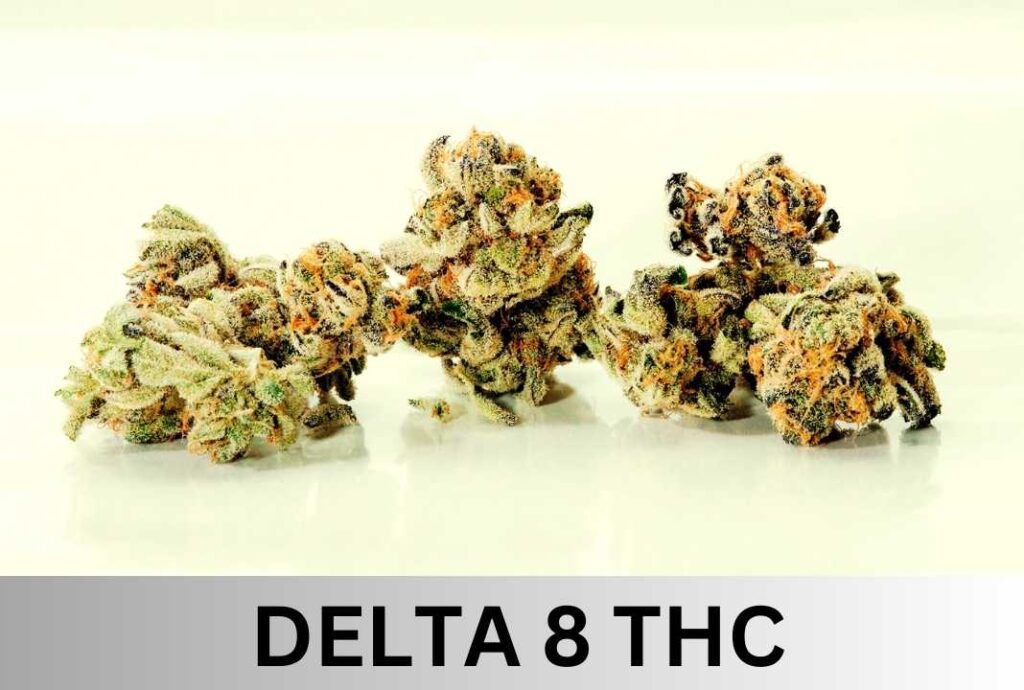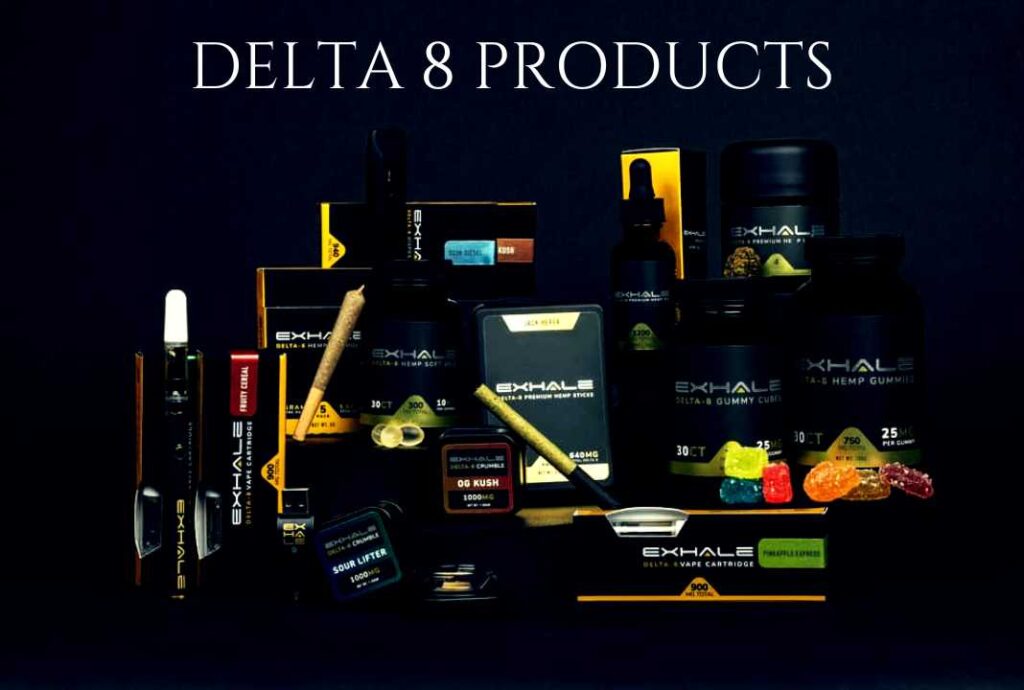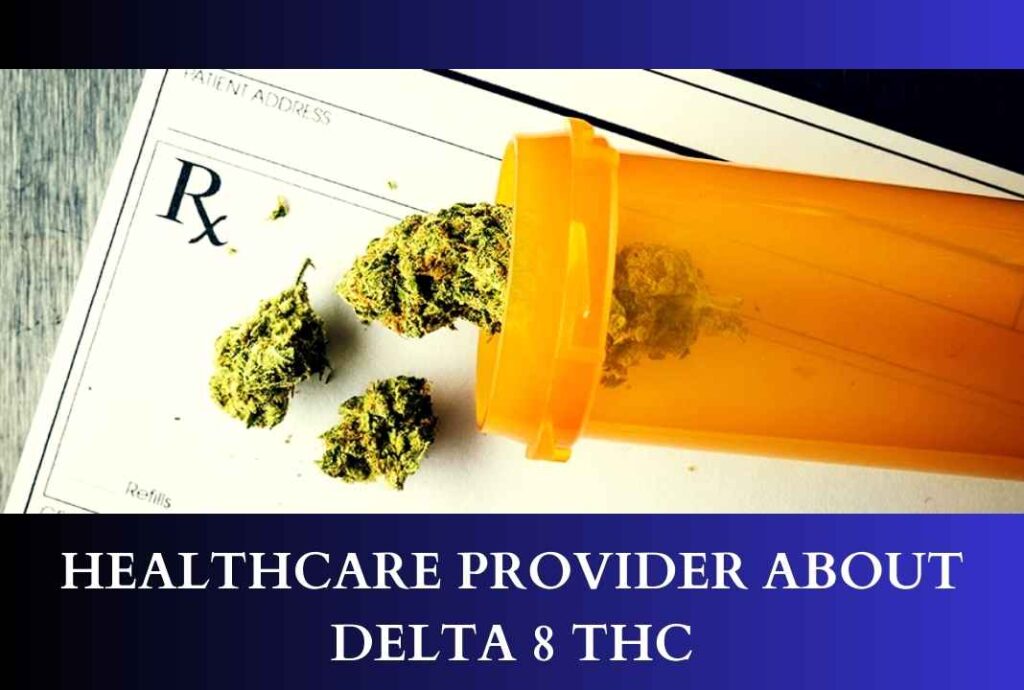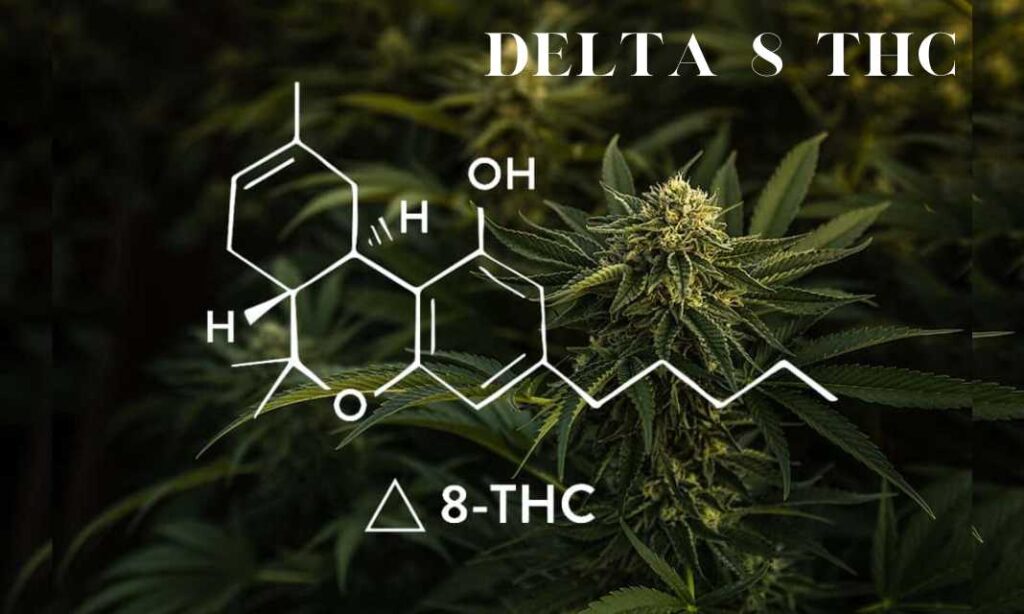The world of cannabinoids is vast and complex, with Delta-8 THC being one of the latest compounds to capture the attention of consumers and researchers alike. As a close relative to the infamous Delta-9 THC found in marijuana, this lesser-known compound has sparked both intrigue and controversy in recent times. So, what exactly is Delta-8 THC, and why is it causing such a stir? Join us as we unravel the mystery of Delta-8 THC and explore its potential benefits, risks, and legal status.
Key Takeaways
- Delta-8 THC is a psychoactive cannabinoid found in cannabis and hemp plants with potentially lower psychoactive effects than Delta-9 THC.
- It has potential therapeutic uses, There are health risks associated with it due to its lack of regulation and possible contaminants introduced during production methods.
- Consultation with healthcare providers is advised before using Delta 8 products, as well as proper storage practices for safety.
Understanding Delta-8 THC

Delta-8 THC is a psychoactive cannabinoid found in trace amounts within the cannabis plant, including both marijuana and hemp varieties. While it shares a similar chemical structure to its more famous cousin, Delta-9 THC, Delta-8 is known to produce milder effects and may come with its own set of serious health risks.
Due to its presence in hemp products and the ever-changing legal landscape surrounding cannabis, Delta-8 THC has become a contentious subject, with concerns about product labeling, potentially misleading consumers, and significant public health issues arising from its use.
Origin and chemical structure
Delta-8 THC originates from the cannabis plant and, like Delta-9 THC, is a naturally occurring compound. However, the production process of Delta-8 THC may involve the use of potentially unsafe household chemicals and other potentially harmful substances, resulting in concerns about the safety and purity of the final product.
Delta-8 THC bears a resemblance to Delta-9 THC in chemical structure, but key differences may result in a less potent psychoactive effect. These differences often position Delta-8 THC as a milder alternative to Delta-9 THC. Yet, it’s worth mentioning that production methods might introduce contaminants and by-products, posing risks to users.
Comparison with Delta-9 THC
A comparison between Delta-8 THC and Delta-9 THC reveals that both compounds possess psychoactive properties. Nevertheless, Delta-8 THC, a psychoactive compound, is often regarded as less potent, potentially producing milder effects compared to the more renowned Delta-9 THC.
Even though its nature might be gentler, the processes used in creating Delta-8 THC could introduce potentially hazardous substances, raising questions about the final product’s safety and purity.
Delta-8 THC Production Methods

There are two primary methods for producing Delta-8 THC: extraction from hemp and conversion from CBD. Both methods can result in varying levels of purity and safety, which has led to significant public health concerns surrounding the compound.
The upcoming sections provide a deeper insight into these production methods, highlighting potential risks and benefits tied to each.
Extraction from hemp
Hemp extraction, which includes obtaining hemp cannabis raw extracts, is one method of obtaining Delta-8 THC, but it often results in low concentrations of the compound and requires further processing. The extraction process typically involves distillation, isomerization, and chromatography, but the final product may contain potentially harmful by-products as a result of the chemicals used in the process.
Although hemp extraction is a viable method for producing Delta-8 THC, the low concentrations of the compound in hemp necessitate additional processing to achieve the desired potency. This further processing involves techniques such as distillation, isomerization, and chromatography, which can introduce additional risks and contaminants.
Conversion From CBD
Converting CBD into Delta-8 THC is another production method, but it may involve the use of potentially harmful chemicals and result in impurities. The conversion process typically involves a chemical synthesis process, which can introduce potentially unsafe household chemicals and other potentially harmful substances.
Despite the potential risks associated with the conversion process, Delta-8 THC products derived from CBD are commonly found in the market. However, users should exercise caution when choosing these products, as the presence of potentially harmful by-products and contaminants may pose health risks.
Health Risks and Safety Concerns

Delta-8 THC is surrounded by numerous health risks and safety concerns, including:
- Adverse events reported to the FDA
- Lack of regulation and oversight in the industry
- Poison control center alerts
- Potential consequences of limited regulation
These safety concerns highlight the need for caution when using Delta-8 THC.
Adverse events reported to the FDA include nausea, vomiting, and anxiety. National poison control centers, as well as animal poison control centers, are often contacted in such cases.
Adverse events and poison control centers
Adverse events related to Delta-8 THC use have been reported to the FDA and poison control centers, including:
- Hospitalizations
- Incidents involving children and pets
- Vomiting
- Hallucinations
- Difficulty maintaining balance
- Loss of consciousness
- Other severe side effects that have led to hospitalizations
In particular, pediatric patients aged 18 and under account for 39% of exposure cases, highlighting the importance of safe storage practices and the potential risks associated with inadvertent exposure.
The surge in adverse event reports and poison control center alerts underscores the urgency for heightened awareness and precaution when using Delta-8 THC products.
Lack of regulation
The lack of regulation for Delta-8 THC products raises concerns about their safety, labeling, and potential contamination with harmful substances. Since these products have not been evaluated or approved by the FDA, the sale of Delta-8 THC products with unsubstantiated therapeutic claims is a violation of federal law.
Furthermore, it is difficult to determine the composition of these products, as they can be synthetically manufactured with potentially hazardous chemicals, including controlled substances.
This absence of regulation and oversight can lead to inconsistencies in product quality, safety, and labeling, as well as potential risks to consumers. As a result, it is crucial for users to exercise caution when purchasing and using Delta-8 THC products and to be aware of the potential risks and legal implications involved.
Potential Therapeutic Uses and Benefits

Despite many concerns about Delta-8 THC’s safety and regulation, reports suggest potential therapeutic uses and benefits. This section explores Delta-8 THC’s potential applications in pain relief, appetite stimulation, and mood enhancement.
However, it is essential to note that further research is needed to confirm these effects and evaluate the long-term safety and effectiveness of Delta-8 THC as a therapeutic agent.
Pain relief and appetite stimulation
Delta-8 THC may offer the following benefits:
- Temporary pain relief
- Stimulation of appetite
- Interaction with the body’s endocannabinoid system, which is responsible for regulating pain perception and other physiological processes
- Reduction of inflammation
- Relief from pain
These benefits make Delta-8 THC a potential option for managing pain.
However, further research is required to understand the full potential of Delta-8 THC as a therapeutic agent for pain relief and appetite stimulation. As with any emerging treatment option, it is crucial to consult with a healthcare provider before using Delta-8 THC to discuss potential risks, benefits, and legal implications.
Mood enhancement
Users of Delta-8 THC have reported mood-enhancing effects, such as relaxation and euphoria, which may be attributed to the compound’s interaction with the endocannabinoid system.
However, the long-term safety and effectiveness of these mood-enhancing benefits are not well-established, and further research is needed to evaluate their potential as a therapeutic intervention.
As always, it is essential to consult with a healthcare provider before using Delta-8 THC to discuss potential risks, benefits, and legal implications.
Legal Status and Drug Testing

Delta-8 THC’s legal status is state-dependent, and its use might impact drug testing. This section examines the complexities of Delta-8 THC’s legal status at the state level and discusses the potential implications of its use on a drug test.
It is important to note that Delta-8 THC is not currently regulated by the federal government.
State-by-state legality
Delta-8 THC is not federally legal, but individual states can regulate its legality, leading to a patchwork of laws and regulations across the country. In some states, Delta-8 THC is explicitly prohibited and classified as a controlled substance, while other states have more permissive regulations in place.
To ensure the legality of Delta-8 THC in your state, it is advisable to consult with your local or state government for further clarification. Additionally, it is essential to be aware of the potential legal implications of using Delta-8 THC and the possible consequences for drug testing.
Drug testing implications
Delta-8 THC can show up on drug tests and may result in a positive test for THC, especially when mixed with Delta-9 THC. It is important to exercise caution when using Delta-8 THC products if you are subject to drug testing, as the presence of THC metabolites in your system may lead to potential legal and professional consequences.
It is important to be aware of the potential risks associated with using Delta-8 THC products.
Responsible Use and Storage

Responsible use and storage of Delta-8 THC products are essential to ensure safety and prevent accidental exposure.
In this section, we will discuss the importance of consulting with healthcare providers before using Delta-8 THC and provide recommendations for safe storage practices.
Consultation with healthcare providers
Prior to using Delta-8 THC, consulting a healthcare provider to discuss potential risks, benefits, and legal implications is paramount. Healthcare providers such as doctors, pharmacists, or cannabis-knowledgeable medical professionals can provide guidance and advice tailored to your specific health status and medication plan.
It is also essential to consider any potential risks, benefits, and legal implications of using Delta-8 THC in your specific situation, as the compound’s safety and effectiveness have not been fully established. Consulting with a healthcare provider can help you make an informed decision about whether Delta-8 THC is an appropriate option for you.
Safe storage practices
Safe storage practices for Delta-8 THC products include keeping them out of reach of children and pets, as well as ensuring proper labeling and packaging to prevent accidental ingestion. Accidental exposure to Delta-8 THC products can lead to adverse events and poison control center notifications, so it is essential to take precautions when storing these products.
To store Delta-8 THC products safely, it is advised to keep them in a cool, dry place, away from direct sunlight, and out of reach of children and pets. By following these storage recommendations, you can help prevent accidental exposure and ensure the safety of both yourself and others.
Summary
In conclusion, Delta-8 THC is a complex and controversial compound that has captured the attention of consumers, researchers, and regulators alike. While it may offer potential therapeutic benefits such as pain relief, appetite stimulation, and mood enhancement, the compound’s safety, legal status, and long-term effects are not yet fully understood. It is essential to consult with healthcare providers, adhere to safe storage practices, and stay informed about the ever-changing legal landscape surrounding Delta-8 THC to ensure responsible use and minimize potential risks.
FAQs
Delta 8 does give a good high, although it is milder than Delta 9 and makes people feel sleepy rather than euphoric.
Delta 8 is a less potent version of THC derived from hemp, not marijuana, making it legal to sell as long as it comes from hemp.
It has become increasingly popular in recent years due to its legal status and the fact that it can provide a milder, more manageable high than traditional THC.
Delta 8 is available in a variety of forms, including edibles.
Delta-8 THC is an unregulated cannabinoid derived from cannabis that has psychoactive and intoxicating effects similar to marijuana, causing adverse effects such as psychosis, severe vomiting and addiction when taken in large amounts.
It is also often mislabeled, potentially exposing consumers to dangerous levels of the substance.
Delta 8 is an analog of THC that binds to the same CB1 receptors in the brain, creating the same euphoric high you get from marijuana and offering unique anti-inflammatory effects.
It attaches to the same receptors as THC, allowing it to produce a similar experience while providing unique benefits.
Delta 8 tetrahydrocannabinol is used to produce milder effects than delta-9 THC, such as euphoric feelings, relaxation and relief from pain.
It is also sometimes used to treat nausea, glaucoma, trouble sleeping, and other conditions, though research is limited.


